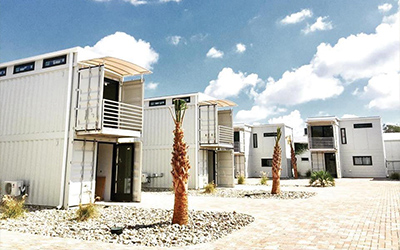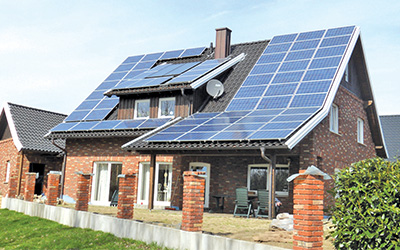As the Wilmington area continues to be a popular place to live, more residential real estate trends are emerging, including a rise in home prices that is expected to continue. Meanwhile, some of the latest industry buzz includes different types of housing and energy, as well as changing preferences among homeowners.
Housing Prices on the Rise

Home sales prices in the Wilmington area have been increasing since 2012, with the average sales price at $292,000 as of December 2018, according to a Metrostudy report.
In the tri-county area, Pender County saw the largest increase in average home sales price from 2013 to 2018. Existing home sales prices in the county, which don’t include sales of distressed homes, went up by 22 percent during those five years.
The Metrostudy takeaways suggest that 2019 will be a neutral year in the residential real estate market because higher construction, labor and interest rate costs have slowed the urgency to build and buy homes. It also stated that overvalued homes run the risk of creating price fatigue among buyers, especially if average mortgage rates go higher than 5 percent.
“It’s all based on supply and demand,” said Don Harris, broker and Realtor with Intracoastal Realty. “Right now, we have very limited supply, prices won’t go up higher than a certain price, but we are not sure when that will be. The biggest thing is short supply, we have more buyers than houses.”
Building Post Hurricane

After Hurricane Florence, some local homeowners have made their homes hurricane-resistant. Spencer Rogers, coastal construction and erosion specialist with N.C. Sea Grant, said more homeowners should take advantage of incentives available to them.
“Many of these mitigation upgrades are not expensive,” Rogers said. “Both wind and flood insurance premium discounts are available to help offset the costs. Most improvements are easiest for new constructions but there are sometimes good opportunities to upgrade later.”
For example, installing a hip roof or window protection offers a 4 to 5 percent discount on wind and/ or hail coverage cost.
One program homeowners can use is FORTIFIED Home from the Institute for Business & Home Safety, which features building methods that go beyond the required local building codes to mitigate damage from hurricanes.
“One study found repairing the water damage averaged three times more expensive than the roofing damage,” Rogers said. “Florence’s roofing damage gives many owners the opportunity to upgrade and reduce the potential for damage in the next storm.”
Containers Continue

In 2018, construction was completed on nine “Live + Work” apartments made from shipping containers in what is known as The Cargo District on Queen Street.
The district is a mixed-use concept of upcycled shipping containers used to create a mix of retail, office and residential spaces. It was developed by Leslie Smith of L.S. Smith Inc. and designed by Rob Romero of Romero Architecture.
The container apartments are all leased, and there is a waitlist for future tenants. The one-bedroom apartments are about 620 square feet and have original container flooring, European-style cabinetry and are designed to be functional and modern, according to the Cargo District website.
With the completion of the nine apartments, developers have plans to build two-bedroom container apartments that use 40- and 45-foot shipping containers, part of the Square 1 project.
Currently, developers are working on commercial projects, including a coffee shop, bottle shop, distillery and a new communal development of container office spaces and Queen Street Barbershop.
Brighter Market for Solar

Cape Fear Solar Systems, a Wilmington-based solar system design and installation company, plans to build a new headquarters and solar complex at 901 S. Front St.
With its new headquarters, the company plans on employing about 65 people, up from its current 22 employees, to meet the demand from local homeowners wanting to use solar energy.
The company has installed about 700 solar systems within a 75-mile radius of Wilmington and Raleigh.
“There are several factors affecting the growth of solar in our area. Utility electric costs are rising, and solar allows home and business owners to produce their own power, giving them independence from the power company and unpredictable rate hikes, and saving thousands of dollars,” said Forrest Sanderson, residential project developer with Cape Fear Solar Systems. “After Hurricane Florence made its way through the Carolinas, we have had an even higher interest in solar with battery storage solutions. Area residents don’t want to be left without power again in this hurricane-prone area.”
More Auxiliary Dwelling Units

Accessory dwelling units (ADUs) were identified by Glenn Harbeck, director of planning, development and transportation for the city of Wilmington, as an option to help address the lack of affordable housing in the area.
ADUs are small residential units attached or detached from a single-family home. Examples include Granny flats, backyard cottages and mother-in-law suites.
In a presentation to the city council, Harbeck said some of the benefits of ADUs include no land cost, lower rent for renters, increased income for homeowners to offset mortgages and the fact that ADUs are usually not obtrusive, meaning construction is minimal and doesn’t impact traffic as compared to other developments.
ADUs are currently allowed in the city in R-7 through R-20 districts for attached units and all residential zones for detached units. Attached ADUs can be up to 800 square feet or 35 percent of the home and detached units can’t be larger than 1,200 square feet. Detached units can’t be taller than the home.
The presentation recommended changing some regulations to incentivize more development of ADUs.

 After Hurricane Florence, some local homeowners have made their homes hurricane-resistant. Spencer Rogers, coastal construction and erosion specialist with N.C. Sea Grant, said more homeowners should take advantage of incentives available to them.
After Hurricane Florence, some local homeowners have made their homes hurricane-resistant. Spencer Rogers, coastal construction and erosion specialist with N.C. Sea Grant, said more homeowners should take advantage of incentives available to them. In 2018, construction was completed on nine “Live + Work” apartments made from shipping containers in what is known as The Cargo District on Queen Street.
In 2018, construction was completed on nine “Live + Work” apartments made from shipping containers in what is known as The Cargo District on Queen Street.  Cape Fear Solar Systems, a Wilmington-based solar system design and installation company, plans to build a new headquarters and solar complex at 901 S. Front St.
Cape Fear Solar Systems, a Wilmington-based solar system design and installation company, plans to build a new headquarters and solar complex at 901 S. Front St. Accessory dwelling units (ADUs) were identified by Glenn Harbeck, director of planning, development and transportation for the city of Wilmington, as an option to help address the lack of affordable housing in the area.
Accessory dwelling units (ADUs) were identified by Glenn Harbeck, director of planning, development and transportation for the city of Wilmington, as an option to help address the lack of affordable housing in the area.


